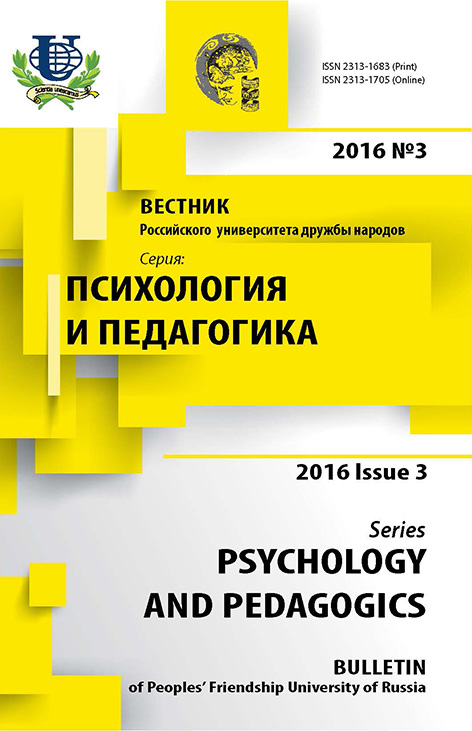ПОТОК И ОПТИМАЛЬНОЕ ПЕРЕЖИВАНИЕ: МЕТОДОЛОГИЧЕСКОЕ ЗНАЧЕНИЕ ДЛЯ ИНТЕРНАЛИЗАЦИИ И КОНТЕКСТУАЛИЗАЦИИ ПОЗИТИВНОЙ ПСИХОЛОГИИ. ЧАСТЬ 2
- Авторы: Рич Г.1
-
Учреждения:
- Ашока Университет
- Выпуск: № 3 (2016)
- Страницы: 7-13
- Раздел: Статьи
- URL: https://journals.rudn.ru/psychology-pedagogics/article/view/14422
- DOI: https://doi.org/10.22363/2313-1683-2016-3-7-13
Цитировать
Полный текст
Аннотация
Данная статья является второй из двух статей, посвященных одному из ключевых понятий позитивной психологии - вершинным переживаниям, называемым «поток», разрабатываемым психологом Михаем Чикесентмихайи - в качестве примера для рассмотрения некоторых вопросов, связанных с интернализацией позитивной психологии. В частности, обсуждаются методологические, психодиагностические и теоретические вопросы исследования состояния потока. Описаны количественные, качественные и смешанные методы изучения состояния потока, включая интервью, анкетирование и кейс-стади. Рассматриваются примеры исследований состояния потока в разных странах мира, поднимающие вопросы относительно качества психодиагностического инструментария, а также кросс кросс-культурных универсалий/различий. Предлагаемый автором подход не сводится к рассмотрению качественных и количественных методов (или антропологических и психологических перспектив) как конкурирующих между собой, он направлен на развитие конструктивного диалога, который признает сильные и слабые стороны каждого подхода, чтобы стимулировать использование смешанных методов исследования сильных сторон человека, чем часто пренебрегают в кросс-культурных исследованиях. В первой статье прежде всего рассматривалось методологическое значение позитивной психологии, во второй - ее кросс-культурная значимость.
Ключевые слова
Об авторах
Грант Рич
Ашока Университет
Автор, ответственный за переписку.
Email: psyj@rudn.university
Образовательный городок Раджива Ганди, Кундли, Сонепат, Харьяна, Индия, 131028
Список литературы
- Brown D.E. Human universals. Boston, MA: McGraw Hill, 1991.
- Csikszentmihalyi M. Flow. New York, N.Y.: Harper Row, 1990.
- Csikszentmihalyi M. The contribution of flow to positive psychology. In J.E. Gillham (Ed.). The science of hope and optimism. Philadelphia, PA: Templeton Foundation Press, 2000, pp. 387-395.
- Csikszentmihalyi M., Csikszentmihalyi I. (Eds.). Optimal experience. New York, N.Y.: Cambridge University Press, 1988.
- Demerouti E. Job characteristics, flow, and performance. Journal of Occupational Health Psychology. 2006, vol. 11, no. 3, pp. 266-280.
- Diener E., Helliwell J.F., Kahneman D.K. (Eds.). International differences in well-being. New York, N.Y.: Oxford University Press, 2010.
- Fischer E.F. The good life: Aspiration, dignity, and the anthropology of wellbeing. Stanford, CA: Stanford University Press, 2014.
- Guthrie R.V. Even the rat was white. (2nd ed.). Boston, MA: Allyn & Bacon, 2003.
- Harari Y.N. Combat flow: Military, political and ethical dimensions of subjective well-being in war. Review of General Psychology. 2008, vol. 12, no. 3, pp. 253-264.
- Henrich J., Heine, S. J., Norenzayan, A. The weirdest people in the world? RatSWD Working Paper. 2010, no. 139. Retrieved from http://dx.doi.org/10.2139/ssrn.1601785
- Jimenez A.C. (Ed.). Culture and wellbeing: Anthropological approaches to freedom and political ethics. Ann Arbor, MI: Pluto Press, 2008.
- Kagan J. Psychology’s ghosts. New Haven, CT: Yale University Press, 2012.
- Lazarovitz S.M. Team and individual flow in female ice hockey players. Dissertation Abstracts International: Section B: Sciences and Engineering, 2004.
- McCormick M., Rich G., Harris O’Brien D., Chai A. Co-curricular activities and student development: How positive nations encourage students to pursue careers in psychology. In H. Agueda Marujo & L. Miguel Neto (Eds.), Positive nations and communities. New York, N.Y.: Springer, 2014, pp. 101-118.
- Marujo H.A., Neto L.M. (Eds.). Positive nations and communities: Collective, qualitative, and cultural-sensitive processes in positive psychology. New York, N.Y.: Springer, 2014.
- Mathews G., Izquierdo C. (Eds.). Pursuits of happiness. New York, N.Y.: Berghahn Books, 2009.
- Moneta G. The flow experience across cultures. Journal of Happiness Studies. 2004, no. 5, pp. 115-121.
- Paredes J.A. In focus: Health, well-being, and happiness. Anthropology News. 2012, no. 53, pp. 5-14.
- Peterson C., Seligman M.E.P. Character strengths and virtues: A handbook and classification. Washington, D.C.: APA, 2004.
- Rich G. Character education. In S.J. Lopez (Ed.), The encyclopedia of positive Psychology. London: Blackwell Publishing, 2009.
- Rich G. The flow experience in jazz pianists: Positive psychological motivation and cognition. Indian Journal of Positive Psychology. 2012, vol. 3, no. 4, pp. 340-344.
- Rich G. A cinematic lens on healthy talent development in piano prodigies: Considerations for positive psychology. [Special issue: Positive Psychology]. Psychology. 2012, vol. 3, no. 12A, doi: 10.4236/psych.2012.312A171.
- Rich G. Positive psychology teaching tools: Supplementing readings to core texts. Office of Teaching Resources in Psychology (OTRP Online), APA Division. 2012, no. 2, pp. 1-19.
- Rich G. Teaching tools for positive psychology. In A. C. Parks (Ed.), Positive psychology in higher education. New York, N.Y.: Routledge, 2013, pp. 71-78.
- Rich G. Finding flow: The history and future of a positive psychology concept. In J. Sinnott (Ed.), Positive psychology: Advances in understanding adult motivation. New York: Springer, 2014a, pp. 43-60.
- Rich G. Positive institutions, communities, and nations: Methods and internationalizing positive psychology concepts. In H. Agueda Marujo & L. Miguel Neto (Eds.). Positive nations and communities: Collective, qualitative, and cultural-sensitive processes in positive psychology. New York, N.Y.: Springer, 2014, pp. 17-34.
- Rich G. The promise of qualitative inquiry for positive psychology: Diversifying methods. Journal of Positive Psychology. 2016. doi: 10.1080/17439760.2016.1225119.
- Rich G. & Gielen U. (Eds.). Pathfinders in international psychology. Charlotte, NC: IAP- Information Age Publishing, 2015.
- Seligman M.E.P., Csikszentmihalyi M. (2000). Positive psychology: An introduction. American Psychologist. 2000, vol. 55, no. 1, pp. 5-14.
- Selin H., Davey G. (Eds.). Happiness across cultures. New York, N.Y.: Springer, 2012.
- Snyder C.R., Lopez S.J., Pedrotti J.T. Positive psychology (2nd ed.). Thousand Oaks, CA: Sage, 2011.
- Sundararajan L. Happiness donut: A Confucian critique of positive psychology. Journal of Theoretical and Philosophical Psychology. 2005, no. 25, pp. 35-60.
- Takooshian H., Gielen U., Plous S., Rich G, Velayo, R. Internationalizing the undergraduate psychology curriculum: Trends, tips, and technologies. American Psychologist. 2016, vol. 71, no 2, pp. 136-147.
- Thin N. Why anthropology can ill afford to ignore well-being. In G. Mathews & C. Izquierdo (Eds.), Pursuits of happiness. New York, N.Y.: Berghahn Books, 2009.
- Turner E. Communitas: The anthropology of collective joy. New York, N.Y.: Palgrave MacMillan, 2012.















